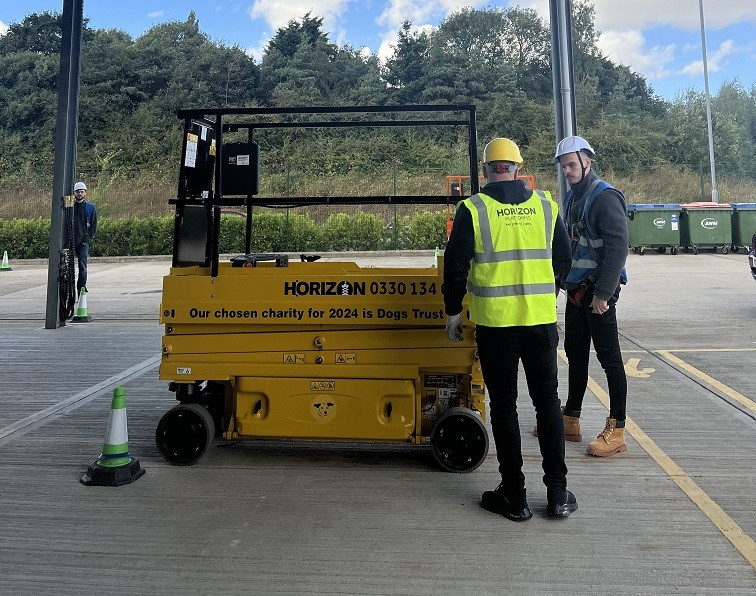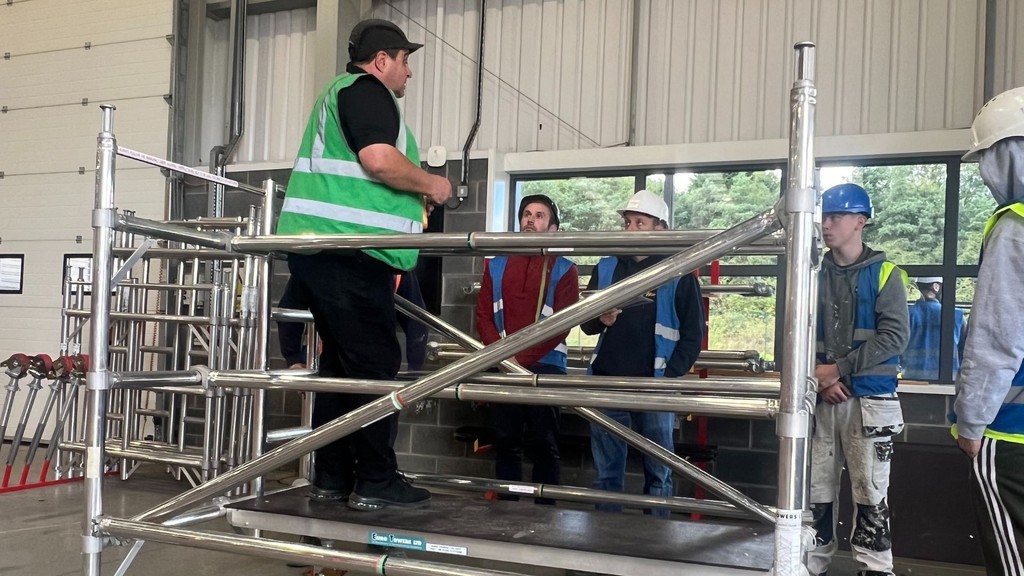Are you wondering what IPAF training is or what PASMA training entails? It’s highly important for anyone who plans to operate access equipment to be fully educated in doing so. After all, not just anyone can use a cherry picker or scissor lift, or erect mobile towers. For example, MEWPs are complex and potentially dangerous pieces of machinery, so knowing how to operate them safely is imperative for helping to prevent accidents.
Not only that, but it is a legal requirement for employers to make sure employees are fully trained before operating machinery or using equipment. Also, operators should provide evidence of adequate training before working with access platforms.
In this guide, Horizon Platforms shares everything you need to know about access platform training, what to expect from an IPAF and PASMA training course and how you can meet legal regulations for operating access platforms.
What is IPAF Training?
IPAF training has been developed by the International Powered Access Federation (IPAF) to ensure industry professionals meet legal training requirements and are able to safely operate powered access platforms. IPAF training courses have set an industry standard, helping to reduce accidents and improve safety.
What Does IPAF Training Cover?
There are different types of IPAF training courses and it’s important to choose the right one depending on a team member’s job role and the equipment the operator will be handling.
IPAF 1b, which covers static boom operation, and IPAF 3a/3b, a combined training course for self-propelled vertical and boom platforms, are perhaps the most widely known IPAF courses available. These courses provide all the theoretical and practical knowledge needed to operate a MEWP safely before real work commences. This includes key dos and don’ts designed to keep operators and those around them safe while working at height.
How Long Does IPAF Training Last?
Your Powered Access Licence (PAL Card) will be valid for five years after you have completed your IPAF training course. You can then take a renewal test during the final year. To make sure operators and demonstrators can take a renewal test, they must have an up-to-date log book with a minimum of 60 entries, with at least 10 logs recorded in the past 12 months.
If you have specific questions about IPAF training, you may find the answers in our helpful IPAF Training FAQs.
What Is PASMA Training?
The Prefabricated Access Suppliers and Manufacturers Association, commonly known as PASMA, is an international not-for-profit association specialising in offering training and publishing safety-related guidance for the mobile access towers industry.
PASMA’s overarching mission is to improve the industry’s safety and standards internationally.
PASMA’s work positively impacts those working in the access towers industry, providing best practice guidance and industry standard training. It works with trade and professional bodies such as the Health and Safety Executive and Access & Scaffold Industry Association, ensuring its training schemes and safety information meets regulation and enhances safety standards.
What Does PASMA Training Cover?
PASMA’s Towers for Users training course is considered an industry must-have, teaching workers how to put together, take apart, inspect and use access towers. However, PASMA offers a wide range of courses specifically developed for the mobile access towers industry, enabling you to select the appropriate course for your needs.
How Long Does PASMA Training Last?
As with IPAF, your PASMA licence will last for five years. If you would like to retain your PASMA qualification, you can undertake training again in the final year or even earlier.
What is the Difference Between IPAF and PASMA Training?
IPAF and PASMA training covers different aspects of working at height, so those working within the industry must select the most appropriate course for their needs and the equipment they will be using.
Powered and non-powered access equipment both require different training.
PASMA training will focus on non-powered mobile access towers, whereas IPAF training specifically focuses on how to safely use MEWPs (Mobile Elevating Work Platforms), such as cherry pickers, scissor lifts, personnel lifts and push-around platforms. Assembly and uses of different types of equipment vary, so it’s vital that operators have comprehensive training that allows them to conduct their role safely.
Both IPAF and PASMA strive to be the standard proof of competence for working at heights and mobile tower safety.
How do you Pass an IPAF or PASMA Training Course?
Successfully taking theory and practical examinations as part of an accredited training programme will result in you passing IPAF or PASMA training. Tests are required to ensure operators, demonstrators, instructors and managers clearly understand legislation and can safely operate access equipment.
Theory tests and practical elements are normally completed during the course but, if they are unable to be completed at the same time, course attendees will be able to take each test separately as theory tests remain valid for four weeks. Before attending the in-person training, delegates will have to complete an e-learning course. Otherwise, they won’t be able to complete the theory and practical tests.
If a candidate were to fail their theory test, they would need to retake the entire course. However, if a theory test is passed but a practical test is failed the individual is able to retake just the practical test within four weeks.
Fortunately, for those who choose Horizon Platforms, we have a 96% IPAF pass rate, so you can be confident our expert training team will give you all the tools you’ll need to pass your training.
What Training And Qualifications Do MEWP Operators Need?
Anyone responsible for operating or inspecting a powered access platform must undertake some form of training; ideally an IPAF course. Those operating a non-powered mobile access tower should consider a PASMA training course. If you need to work with mobile access platforms and non mobile towers, we offer a combined IPAF and PASMA course.
Do You Need A Licence For A Scissor Lift Or Cherry Picker In The UK?
The Work at Height Regulations 2005 state that,
‘Every employer shall ensure that no person engages in any activity, including organisation, planning and supervision, in relation to work at height or work equipment for use in such work unless he is competent to do so or, if being trained, is being supervised by a competent person.’
Similarly, the Lifting Operations and Lifting Equipment Regulations 1998 (LOLER) states that lifting operations must be planned by a competent person.
Hence why there are a variety of powered access training courses from operators, managers and employers.
It’s generally accepted that IPAF training courses are the industry standard. These courses are designed to enhance knowledge, minimise health and safety risks, and ultimately prevent incidents from occurring.
It’s the responsibility of the employer, contractor and individual to ensure operators are familiar with MEWP controls and have a thorough understanding of safety and emergency procedures before using potentially dangerous equipment.
If those operating mobile access platforms are not adequately trained, employers or individuals may be liable for any accident or incident that may occur, leading to hefty fines and substantial damage to the reputation of your business. Trained individuals are much more likely to be able to reduce the risk of hazards and will have a more thorough understanding of how to safely operate certain equipment.
As our training manager Ben Hughes says: “It is essential that operators are trained to a competent standard for the safety of everyone concerned. If they aren’t adequately trained, with evidence to back it up, proving that in a court of law or a tribunal would be extremely difficult and could result in a large fine or jail time, or both!”
What Is An IPAF MEWPs For Managers Training Course?
Those who oversee the work of MEWP operators should achieve additional certification that demonstrates they can ensure work is carried out safely and properly.
The IPAF MEWPs for Managers course covers various elements, such as understanding Health & Safety regulations and machine classifications. This ensures managers are aware of accident prevention and control, and have the in-depth knowledge of relevant regulations needed to prepare for and coordinate the safe operation of cherry pickers and boom lifts.
Instructors must undertake a different type of training, too. The IPAF Instructor Training Course is much more intensive, with stringent entry requirements. To qualify for training, the individual must have 36 months’ MEWP operating experience, have held an IPAF Operator Licence for a minimum of six months, and have held an IPAF Demonstrator Licence for at least three months.
The instructor course lasts five days, though the individual must also be able to demonstrate First Aid Training, Safety Harness Instructor Training, MEWPS for Managers Training and Instructor Techniques Course Training. Completing all training courses will take 13 days.
Access Platform Training Courses at Horizon Platforms
Here at Horizon Platforms, our qualified trainers deliver a range of courses in West Yorkshire, at training centres across the UK, and in workplaces. With a 96% pass rate, supportive and knowledgeable trainers, multilingual course material and Saturday courses available, our training courses provide a flexible and effective learning method.
We practise what we preach, too.
Horizon Platforms have been awarded IPAF Rental+ status, demonstrating that we have achieved the highest audit standards in key areas within the business. Safety and good service are our team’s top priorities. All training equipment is inspected regularly and our operators are trained to the highest of standards so, when you choose to train with us, you can rest assured we take this responsibility seriously.
Speak to a member of Horizon Platforms’ training team or head over to our PASMA and IPAF training pages to find the ideal course to suit your needs.
If you’re looking for more information and access platform advice, bookmark the Horizon Platform blog to keep up to date.


